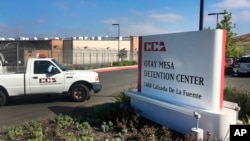More people will die of the coronavirus in U.S. immigration custody unless the Trump administration rapidly improves conditions and releases more detainees, lawyers and advocates warned Thursday, following the first confirmed virus-related death of a detainee.
A complaint sent to the Department of Homeland Security includes the stories of 17 people who allege they have been denied release despite in some cases having medical conditions putting them at higher risk of infection. They include a man in remission from a form of cancer known as follicular lymphoma and a woman with pre-diabetes.
Carlos Ernesto Escobar, a 57-year-old man from El Salvador, died Wednesday at the Otay Mesa Detention Center in San Diego, which was holding 132 of the 705 U.S. Immigration and Customs Enforcement detainees who have tested positive for COVID-19, the disease caused by the coronavirus.
ICE says it has tested 1,460 detainees and has just under 30,000 people in custody.
According to a representative for his family, Escobar was diabetic and was placed on a ventilator after contracting the virus in detention.
ICE says it has released more than 900 people considered to be at risk. In a statement, the agency said it has staggered meal and recreation times to increase social distancing and isolated people exposed to someone who was infected as well as those newly detained.
A coalition of groups including the American Immigration Council and American Immigration Lawyers Association filed Thursday's complaint, which underscores persistent allegations that detainees are being denied protective gear, cleaning supplies, or adequate space to observe social distancing.
Katie Shepherd, a lawyer at the American Immigration Council, said Escobar's death was avoidable and blamed ICE for "a senseless waste of human life." Shepherd called on ICE to hasten the release of people in its custody and provide more personal protective equipment to detainees.
"We knew it was going to happen. It was just a matter of when," Shepherd said. "But I am afraid about how many more deaths will happen."
Detainees at Otay Mesa have reported being denied masks unless they sign a waiver that prevents them from holding private prison operator CoreCivic responsible if they catch the virus. A CoreCivic spokeswoman denied that masks have been withheld, but said the original form requiring a signature was withdrawn.
A man detained at another CoreCivic jail, the Houston Contract Detention Facility, says in the complaint that he was presented with a similar waiver, which he signed "to avoid problems with the officials."
The man also alleges that guards have not provided enough soap for them to bathe themselves, nor have they given out gloves to use when the detainees clean their living area. Two detainees at the Houston facility have confirmed cases of COVID-19.
The man's claims could not be independently verified. CoreCivic spokeswoman Amanda Gilchrist denied that detainees were denied soap, saying guards issue a 2 ounce (60 ml) bottle to each person and provide additional bottles at no cost. She said the jail has enough supplies for "intensified cleaning and disinfecting practices."
For most people, the coronavirus causes mild or moderate symptoms, such as fever and cough that clear up in two to three weeks. For some, especially older adults and people with existing health problems, it can cause more severe illness, including pneumonia, or death.














